茶与咖啡的文化差异1000字英语
茶和咖啡的差异和相同英语作文
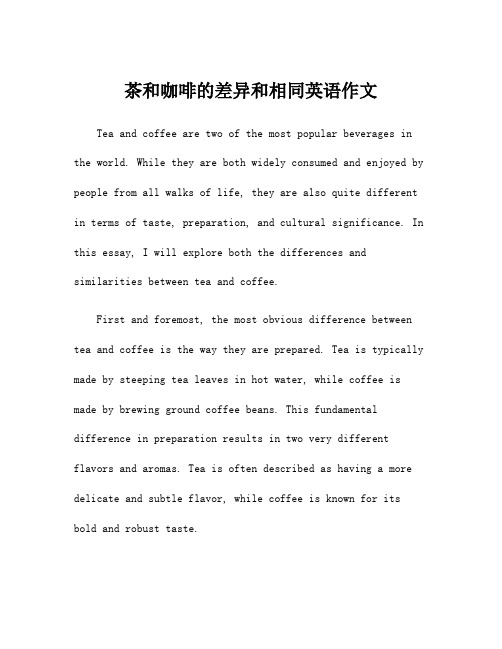
茶和咖啡的差异和相同英语作文Tea and coffee are two of the most popular beverages in the world. While they are both widely consumed and enjoyed by people from all walks of life, they are also quite different in terms of taste, preparation, and cultural significance. In this essay, I will explore both the differences and similarities between tea and coffee.First and foremost, the most obvious difference between tea and coffee is the way they are prepared. Tea is typically made by steeping tea leaves in hot water, while coffee is made by brewing ground coffee beans. This fundamental difference in preparation results in two very different flavors and aromas. Tea is often described as having a more delicate and subtle flavor, while coffee is known for its bold and robust taste.Another key difference between tea and coffee is the way they are consumed in different cultures. In many Asian countries, such as China and Japan, tea is an integral part of the cultural and social rituals. It is often served during formal ceremonies and is deeply ingrained in the customs and traditions of these societies. On the other hand, coffee is more commonly associated with the Western world, where it is often consumed on a daily basis as a morning pick-me-up or as a social beverage to be enjoyed with friends.Despite these differences, tea and coffee also share some similarities. For example, both beverages contain a certain amount of caffeine, which gives them their stimulating effects. Additionally, both tea and coffee have been shown to have certain health benefits when consumed in moderation. They are both rich in antioxidants and have been linked to a reduced risk of certain diseases, including heart disease and cancer.Furthermore, both tea and coffee have a rich and diverse history that dates back centuries. Tea has a long and storied history in many Asian cultures, where it has been revered for its medicinal properties and used in traditional Chinese and Ayurvedic medicine. Coffee, on the other hand, has a more recent but equally fascinating history, dating back to ancient Ethiopia and the Arabian Peninsula.In conclusion, while tea and coffee are distinctly different in many ways, they also share some commonalities. Both beverages are beloved by millions of people around the world and have played a significant role in the social, cultural, and gastronomic traditions of various societies. Whether you prefer the subtle and soothing taste of tea or the bold and invigorating flavor of coffee, there is no denying that both beverages have a special place in the hearts and cups of people everywhere.。
专升本考试英语作文茶咖啡
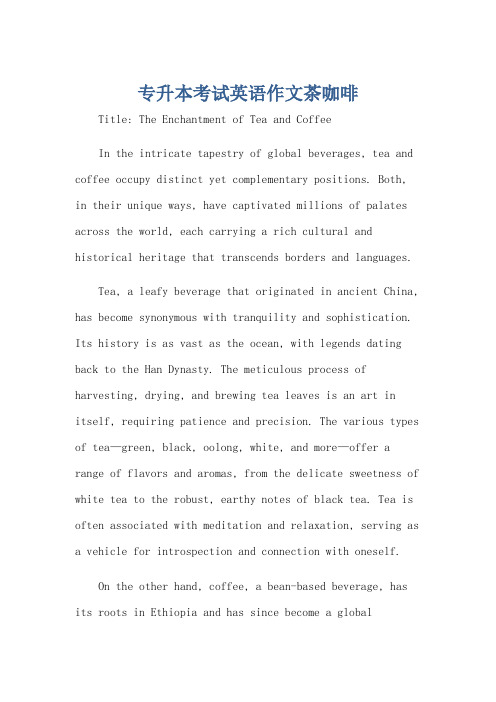
专升本考试英语作文茶咖啡Title: The Enchantment of Tea and CoffeeIn the intricate tapestry of global beverages, tea and coffee occupy distinct yet complementary positions. Both,in their unique ways, have captivated millions of palates across the world, each carrying a rich cultural and historical heritage that transcends borders and languages. Tea, a leafy beverage that originated in ancient China, has become synonymous with tranquility and sophistication. Its history is as vast as the ocean, with legends dating back to the Han Dynasty. The meticulous process of harvesting, drying, and brewing tea leaves is an art in itself, requiring patience and precision. The various types of tea—green, black, oolong, white, and more—offer a range of flavors and aromas, from the delicate sweetness of white tea to the robust, earthy notes of black tea. Tea is often associated with meditation and relaxation, serving as a vehicle for introspection and connection with oneself.On the other hand, coffee, a bean-based beverage, has its roots in Ethiopia and has since become a globalphenomenon. The robust aroma and stimulating effects of coffee have made it a favorite among those seeking a quick pick-me-up or a companion for long, productive sessions. The art of roasting and grinding coffee beans, as well as the various brewing methods, contribute to the unique taste profiles of each cup. From the smooth, mellow flavors of arabica to the bold, intense notes of robusta, coffeeoffers a diverse range of experiences.The comparison between tea and coffee often extends beyond their taste and aroma. Tea is often seen as a symbol of tranquility and harmony, reflecting the philosophy of Eastern cultures. It is often consumed in quiet moments, either alone or with friends, as a means of connecting with oneself and others. Conversely, coffee is often associated with dynamism and productivity, reflecting the bustling energy of Western societies. It is a common sight in cafes, offices, and even on the go, serving as a companion for busy lives.However, the divide between tea and coffee is not as rigid as it may seem. Many people enjoy both beverages, depending on their mood, occasion, or cultural background.In fact, some coffee shops now offer a range of tea options, and vice versa, reflecting the increasing intermingling of cultures and tastes.Moreover, the health benefits of both tea and coffee have been extensively studied. Tea, especially green tea,is known for its antioxidant properties, while coffee has been linked to improved cognitive function and reduced risk of certain diseases. Of course, the consumption of both should be moderated, as excessive intake can have negative effects.In conclusion, tea and coffee are not just beverages; they are cultural icons, symbols of tradition and innovation. They have the power to transport us todifferent places and times, offering a window into the rich tapestry of human history and culture. Whether you prefer the serene serenity of a cup of tea or the invigoratingbuzz of a cup of coffee, there is no denying the enchantment of these two beverages that have captivated hearts and minds for centuries.。
比较咖啡和茶的英语作文
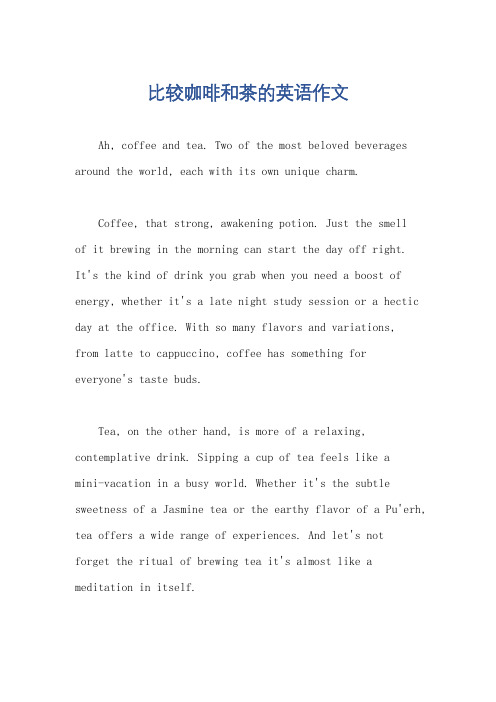
比较咖啡和茶的英语作文Ah, coffee and tea. Two of the most beloved beverages around the world, each with its own unique charm.Coffee, that strong, awakening potion. Just the smellof it brewing in the morning can start the day off right.It's the kind of drink you grab when you need a boost of energy, whether it's a late night study session or a hectic day at the office. With so many flavors and variations,from latte to cappuccino, coffee has something foreveryone's taste buds.Tea, on the other hand, is more of a relaxing, contemplative drink. Sipping a cup of tea feels like amini-vacation in a busy world. Whether it's the subtle sweetness of a Jasmine tea or the earthy flavor of a Pu'erh, tea offers a wide range of experiences. And let's notforget the ritual of brewing tea it's almost like a meditation in itself.But here's the thing: coffee and tea don't have to be mutually exclusive. You can be a coffee lover in themorning and switch to tea in the evening. The beauty ofboth drinks is that they each have their own time and place. Coffee for the go-getters, tea for the dreamers. And sometimes, on a perfect day, you might even enjoy both!。
英语作文茶与咖啡
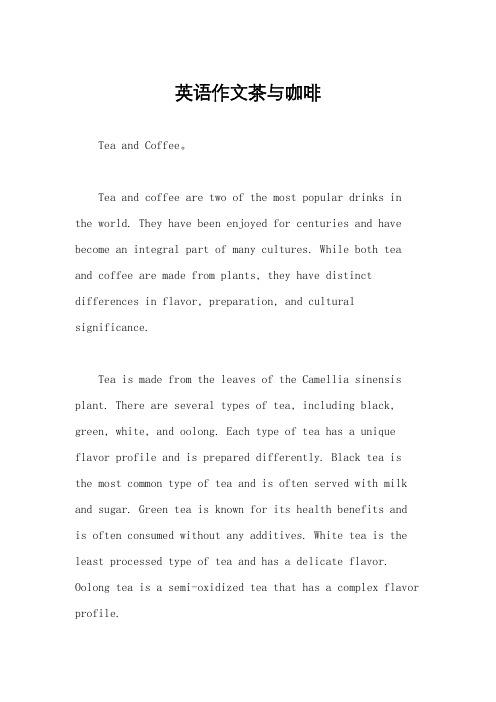
英语作文茶与咖啡Tea and Coffee。
Tea and coffee are two of the most popular drinks in the world. They have been enjoyed for centuries and have become an integral part of many cultures. While both tea and coffee are made from plants, they have distinct differences in flavor, preparation, and cultural significance.Tea is made from the leaves of the Camellia sinensis plant. There are several types of tea, including black, green, white, and oolong. Each type of tea has a unique flavor profile and is prepared differently. Black tea is the most common type of tea and is often served with milk and sugar. Green tea is known for its health benefits andis often consumed without any additives. White tea is the least processed type of tea and has a delicate flavor. Oolong tea is a semi-oxidized tea that has a complex flavor profile.Coffee, on the other hand, is made from the roasted seeds of the Coffea plant. There are two main types ofcoffee beans: Arabica and Robusta. Arabica beans are considered higher quality and have a smoother, more complex flavor. Robusta beans are cheaper and have a stronger, more bitter taste. Coffee can be prepared in many different ways, including drip, French press, espresso, and cold brew.Tea and coffee have different cultural significance in various parts of the world. In many Asian countries, tea is a symbol of hospitality and is often served to guests. In Britain, tea is a part of daily life and is oftenassociated with afternoon tea. In the United States, coffee is the go-to drink for many people and is often consumed on the go.Both tea and coffee have health benefits. Tea is richin antioxidants and has been shown to reduce the risk of heart disease and certain types of cancer. Coffee also has antioxidants and has been linked to a reduced risk of Parkinson's disease, type 2 diabetes, and liver disease.In conclusion, tea and coffee are two beloved beverages that have their own unique characteristics. Whether you prefer the delicate flavor of tea or the bold taste of coffee, both drinks have a place in our daily lives and in our cultures. So, sit back, relax, and enjoy a cup of your favorite beverage.。
中国茶文化与西方咖啡文化的对比分析_英语论文

---------------------------------------------------------------范文最新推荐------------------------------------------------------ 中国茶文化与西方咖啡文化的对比分析_英语论文Abstract Tea and coffee has become an indispensable part in people’s life. After thousands of years of development, both of them have formed their unique cultures. Under the influence of different cultures in China and the west, Chinese tea culture and western coffee culture are also different. Under the trend of globalization, the communication between Chinese and western countries becomes more and more frequent. Intercultural interactions are also increasingly prominent. This thesis will study the cultural differences reflected in Chinese tea and western coffee, so that we can know more about the cultural backgrounds of China and western countries in order to avoid cultural conflicts and also better able to promote cultural exchanges.This paper falls into five parts. Part one serves as an1 / 8introduction. Part two is the history of Chinese tea culture and Western coffee culture. Part three is aiming at the comparison between Chinese tea culture and Western coffee culture. In Part four, Chinese tea culture and Western coffee culture in globalization are explored. The last part, Part five, is a conclusion.Key Words: tea culture, coffee culture, cultural differencesii摘要茶和咖啡在人们生活中已成为不可缺少的一部分,经过数千年的发展,两者已形成了其独特的文化。
茶和咖啡英文作文
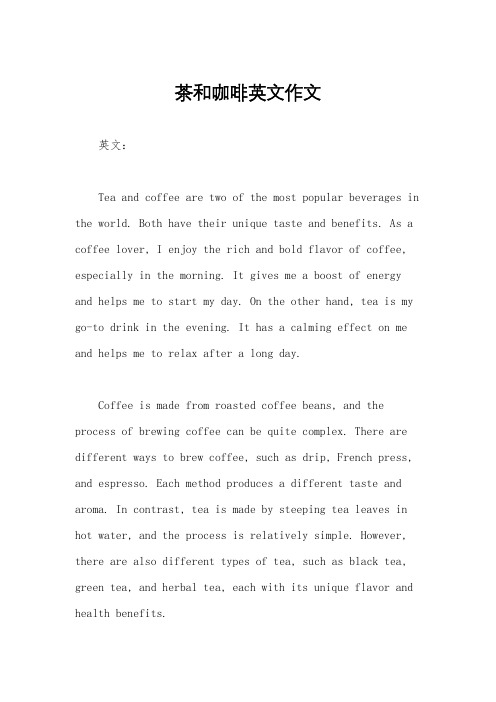
茶和咖啡英文作文英文:Tea and coffee are two of the most popular beverages in the world. Both have their unique taste and benefits. As a coffee lover, I enjoy the rich and bold flavor of coffee, especially in the morning. It gives me a boost of energy and helps me to start my day. On the other hand, tea is my go-to drink in the evening. It has a calming effect on me and helps me to relax after a long day.Coffee is made from roasted coffee beans, and the process of brewing coffee can be quite complex. There are different ways to brew coffee, such as drip, French press, and espresso. Each method produces a different taste and aroma. In contrast, tea is made by steeping tea leaves in hot water, and the process is relatively simple. However, there are also different types of tea, such as black tea, green tea, and herbal tea, each with its unique flavor and health benefits.One of the advantages of coffee is its high caffeine content, which can improve mental alertness and reduce fatigue. However, excessive caffeine consumption can leadto negative effects such as anxiety and insomnia. Tea, on the other hand, contains less caffeine than coffee, but it has other beneficial compounds such as antioxidants and polyphenols, which can boost immunity and reduce the riskof chronic diseases.In terms of cultural significance, tea has a longhistory in many countries, such as China, Japan, and England. It is often associated with relaxation, meditation, and social gatherings. Coffee, on the other hand, is more commonly associated with productivity, work, andsocializing in cafes.Overall, both tea and coffee have their unique tasteand benefits, and it ultimately comes down to personal preference. Some people may prefer the bold flavor of coffee, while others may enjoy the calming effect of tea.It's important to consume them in moderation and be awareof their potential health effects.中文:茶和咖啡是世界上最受欢迎的两种饮料之一。
茶与咖啡的比较英语作文
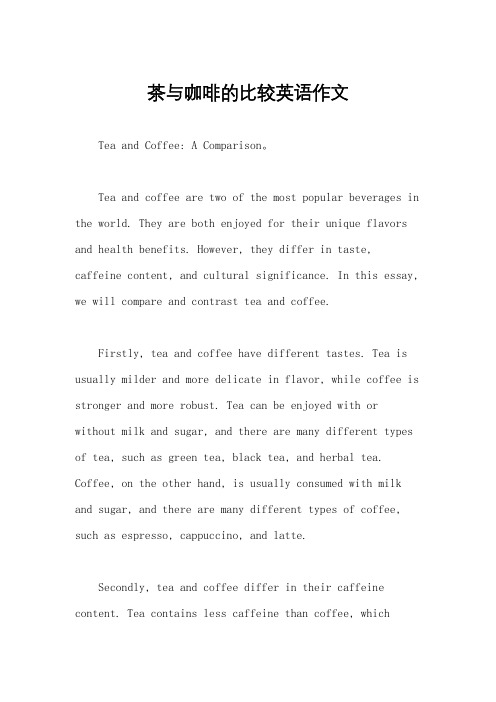
茶与咖啡的比较英语作文Tea and Coffee: A Comparison。
Tea and coffee are two of the most popular beverages in the world. They are both enjoyed for their unique flavors and health benefits. However, they differ in taste,caffeine content, and cultural significance. In this essay, we will compare and contrast tea and coffee.Firstly, tea and coffee have different tastes. Tea is usually milder and more delicate in flavor, while coffee is stronger and more robust. Tea can be enjoyed with or without milk and sugar, and there are many different types of tea, such as green tea, black tea, and herbal tea. Coffee, on the other hand, is usually consumed with milk and sugar, and there are many different types of coffee, such as espresso, cappuccino, and latte.Secondly, tea and coffee differ in their caffeine content. Tea contains less caffeine than coffee, whichmakes it a better choice for those who are sensitive to caffeine. Tea also contains theanine, an amino acid that promotes relaxation and reduces stress. Coffee, on the other hand, contains more caffeine, which makes it a better choice for those who need a quick energy boost. However, excessive caffeine consumption can lead to negative side effects such as insomnia, anxiety, and jitters.Lastly, tea and coffee have different cultural significances. Tea is deeply rooted in Chinese and Japanese cultures, where it is seen as a symbol of hospitality, respect, and harmony. Tea ceremonies are an important part of these cultures, and they are often used to celebrate special occasions or to welcome guests. In contrast, coffee is more popular in Western cultures, where it is seen as a symbol of productivity, efficiency, and socialization. Coffee shops are often used as meeting places for friends and colleagues, and they are also popular among students and professionals who need a quiet place to study or work.In conclusion, tea and coffee are two of the most popular beverages in the world. They differ in taste,caffeine content, and cultural significance. Both tea and coffee have their own unique benefits and drawbacks, and it is up to each individual to decide which one is best for them. Whether you prefer a cup of tea or a cup of coffee, both beverages are sure to provide you with a satisfying and enjoyable experience.。
茶和咖啡作文模板英语
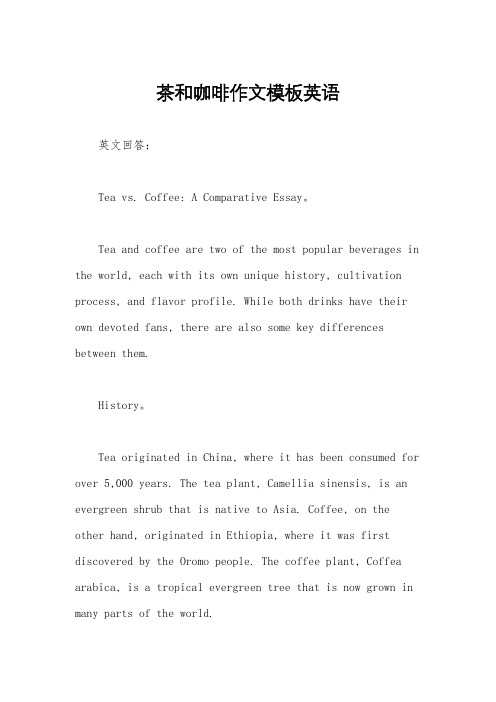
茶和咖啡作文模板英语英文回答:Tea vs. Coffee: A Comparative Essay。
Tea and coffee are two of the most popular beverages in the world, each with its own unique history, cultivation process, and flavor profile. While both drinks have their own devoted fans, there are also some key differences between them.History。
Tea originated in China, where it has been consumed for over 5,000 years. The tea plant, Camellia sinensis, is an evergreen shrub that is native to Asia. Coffee, on the other hand, originated in Ethiopia, where it was first discovered by the Oromo people. The coffee plant, Coffea arabica, is a tropical evergreen tree that is now grown in many parts of the world.Cultivation。
Tea plants are typically grown in subtropical or tropical climates, while coffee plants can be grown in a wider range of climates, including tropical, subtropical, and Mediterranean. Tea plants require well-drained, acidic soil and plenty of sunlight. Coffee plants, on the other hand, prefer slightly acidic soil and partial shade.Processing。
茶和咖啡的英语作文

茶和咖啡的英语作文Tea and CoffeeTea and coffee are two of the most widely consumed beverages in the world. Both have a rich history and cultural significance, and each offers its own unique set of benefits and characteristics. In this essay, we will explore the origins, production, and consumption of tea and coffee, as well as the differences and similarities between the two.Tea has been consumed for thousands of years, with its origins tracing back to ancient China. The legend of tea's discovery tells of a Chinese emperor, Shennong, who was boiling water when a few leaves from a nearby tea plant fell into his cup. Intrigued by the aroma and flavor, Shennong is said to have been the first person to drink tea. Over the centuries, tea cultivation and consumption spread throughout Asia and eventually to the rest of the world.The production of tea involves several steps, beginning with the harvesting of the tea leaves. The leaves are typically plucked by hand, with the youngest and most tender leaves being the most prized. After harvesting, the leaves undergo a series of processing steps, such as withering, rolling, and oxidation, which help to develop theunique flavor and aroma of the tea. The final step is drying the leaves, which can be done through a variety of methods, including air-drying, pan-firing, or oven-drying.Tea can be broadly categorized into several different types, including black tea, green tea, oolong tea, and white tea. The differences between these types are largely determined by the degree of oxidation that the leaves undergo during processing. Black tea, for example, is fully oxidized, giving it a robust and full-bodied flavor, while green tea is minimally oxidized, resulting in a more delicate and grassy taste.In contrast to tea, coffee has its origins in the Horn of Africa, specifically in the region of Kafa, Ethiopia. The earliest recorded evidence of coffee consumption dates back to the 15th century, when the Sufi mystics of Yemen began drinking a brew made from the roasted and ground coffee beans. From there, coffee cultivation and consumption spread throughout the Middle East, Europe, and eventually the Americas.The coffee production process is similar to that of tea, with the key difference being the roasting of the coffee beans. After the coffee cherries are harvested, they are processed to remove the outer layers and extract the beans, or "coffee seeds." The beans are then roasted at high temperatures, which helps to develop their unique flavor andaroma. The degree of roasting can vary, ranging from light to dark, and each roast level produces a different taste profile.Like tea, there are several different types of coffee, including Arabica and Robusta, which are the two main species of coffee plants. Arabica coffee is generally considered to be of higher quality, with a more complex and nuanced flavor, while Robusta coffee is known for its higher caffeine content and more bitter taste.Despite their differences, tea and coffee share some similarities. Both are widely consumed around the world and have become integral parts of many cultures and traditions. Both also offer a range of health benefits, with tea being rich in antioxidants and coffee providing a boost of caffeine to help improve focus and energy levels.However, there are also some key differences between the two beverages. Tea is typically consumed hot, while coffee can be enjoyed hot or cold. Tea also tends to be less acidic than coffee, making it a more gentle option for those with sensitive stomachs. Additionally, the caffeine content in tea is generally lower than that of coffee, making it a more mellow and soothing option for some.In conclusion, tea and coffee are both fascinating and complex beverages that have played a significant role in shaping humanhistory and culture. Whether you prefer the delicate and nuanced flavors of tea or the bold and invigorating taste of coffee, there is no denying the enduring appeal and significance of these two beloved drinks.。
咖啡和茶的英语作文模板

咖啡和茶的英语作文模板Coffee and Tea: A Comparison。
Introduction。
Coffee and tea are two of the most popular beverages in the world. They have been enjoyed for centuries and have become an integral part of many cultures. Both beverages have their own unique flavors, aromas, and health benefits. In this essay, we will compare and contrast the two, exploring their origins, cultivation, processing, and consumption.Origins。
Coffee and tea have different origins. Coffee is derived from the seeds of the Coffea plant, which is native to tropical Africa and Madagascar. The plant was later introduced to other parts of the world, such as Central and South America, where it is now widely cultivated. Tea, on the other hand, comes from the leaves of the Camellia sinensis plant, which is native to East Asia. The plant is grown in countries such as China, India, and Sri Lanka, where it has been cultivated for thousands of years.Cultivation。
咖啡和茶英语作文
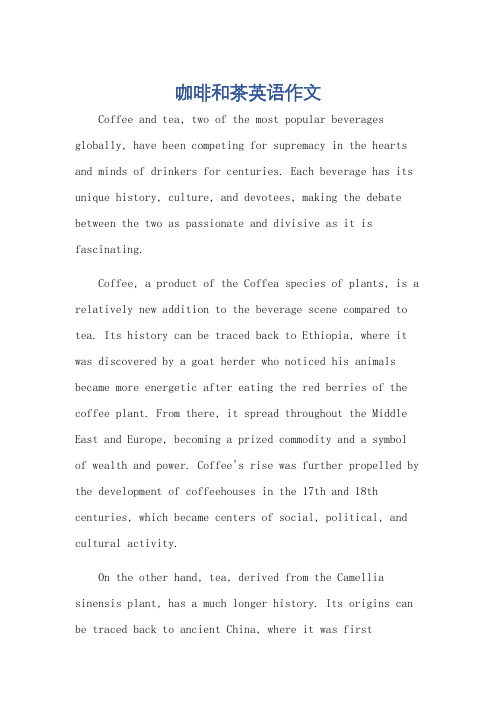
咖啡和茶英语作文Coffee and tea, two of the most popular beverages globally, have been competing for supremacy in the hearts and minds of drinkers for centuries. Each beverage has its unique history, culture, and devotees, making the debate between the two as passionate and divisive as it is fascinating.Coffee, a product of the Coffea species of plants, is a relatively new addition to the beverage scene compared to tea. Its history can be traced back to Ethiopia, where it was discovered by a goat herder who noticed his animals became more energetic after eating the red berries of the coffee plant. From there, it spread throughout the Middle East and Europe, becoming a prized commodity and a symbol of wealth and power. Coffee's rise was further propelled by the development of coffeehouses in the 17th and 18th centuries, which became centers of social, political, and cultural activity.On the other hand, tea, derived from the Camellia sinensis plant, has a much longer history. Its origins can be traced back to ancient China, where it was firstdiscovered as a medicinal herb. Over time, tea evolved into a beverage of choice, with different varieties and preparation methods developed in various cultures aroundthe world. Tea has always been associated with peace, tranquility, and refinement, and its consumption is often linked to cultural and spiritual practices.The debate between coffee and tea lovers often revolves around taste, caffeine content, and health benefits. Coffee is known for its robust, bitter, and sometimes sweet flavor, while tea offers a wide range of flavors from delicate and floral to bold and bracing. Caffeine content also varies between the two beverages, with coffee typically containing more caffeine than tea. However, the health benefits ofboth coffee and tea are numerous and vary depending on the type and preparation method. Coffee is rich in antioxidants and may help reduce the risk of certain diseases, while tea is also known for its antioxidant properties and potentialto improve heart health and reduce stress.In conclusion, the rivalry between coffee and tea is as much about culture and tradition as it is about taste and health benefits. Both beverages have their unique charm anddevotees, and the debate between them is unlikely to end anytime soon. Whether you prefer the rich, robust flavor of coffee or the delicate, refreshing taste of tea, there's no denying that both have played a significant role in shaping global culture and history.**咖啡与茶:全球饮品的竞争**咖啡和茶,这两种全球最受欢迎的饮品,几百年来一直在争夺人们心中的至高无上地位。
奶茶和咖啡的区别英语作文
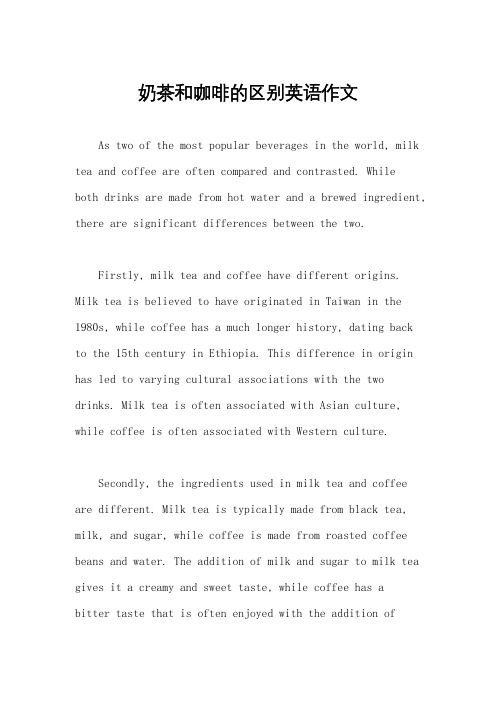
奶茶和咖啡的区别英语作文As two of the most popular beverages in the world, milk tea and coffee are often compared and contrasted. Whileboth drinks are made from hot water and a brewed ingredient, there are significant differences between the two.Firstly, milk tea and coffee have different origins.Milk tea is believed to have originated in Taiwan in the 1980s, while coffee has a much longer history, dating backto the 15th century in Ethiopia. This difference in origin has led to varying cultural associations with the two drinks. Milk tea is often associated with Asian culture, while coffee is often associated with Western culture.Secondly, the ingredients used in milk tea and coffee are different. Milk tea is typically made from black tea, milk, and sugar, while coffee is made from roasted coffee beans and water. The addition of milk and sugar to milk tea gives it a creamy and sweet taste, while coffee has abitter taste that is often enjoyed with the addition ofsugar or milk.Thirdly, the caffeine content in milk tea and coffee is different. While both drinks contain caffeine, coffee has a much higher caffeine content than milk tea. This makescoffee a popular choice for those who need a quick energy boost, while milk tea is often enjoyed for its calming properties.Finally, the way in which milk tea and coffee are consumed is different. Milk tea is often enjoyed as a cold drink, while coffee is typically consumed hot. Additionally, milk tea is often served with pearls or other toppings, while coffee is usually consumed plain.In conclusion, while milk tea and coffee may seemsimilar on the surface, they have significant differencesin origin, ingredients, caffeine content, and consumption methods. Both drinks are beloved by many, and the choice between the two ultimately comes down to personal preference.。
咖啡与茶 英语文本
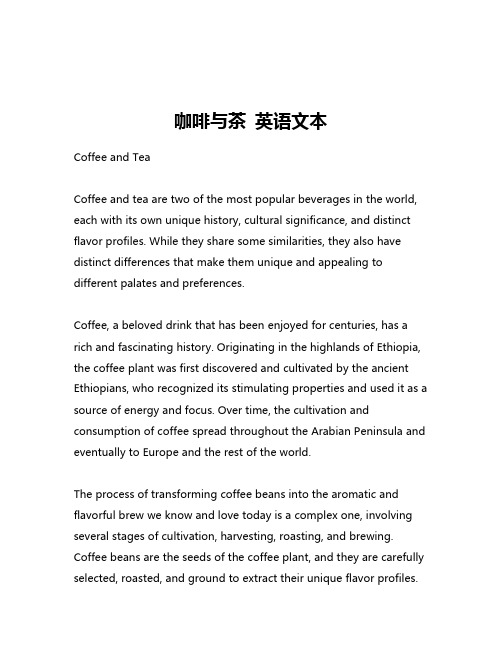
咖啡与茶英语文本Coffee and TeaCoffee and tea are two of the most popular beverages in the world, each with its own unique history, cultural significance, and distinct flavor profiles. While they share some similarities, they also have distinct differences that make them unique and appealing to different palates and preferences.Coffee, a beloved drink that has been enjoyed for centuries, has a rich and fascinating history. Originating in the highlands of Ethiopia, the coffee plant was first discovered and cultivated by the ancient Ethiopians, who recognized its stimulating properties and used it as a source of energy and focus. Over time, the cultivation and consumption of coffee spread throughout the Arabian Peninsula and eventually to Europe and the rest of the world.The process of transforming coffee beans into the aromatic and flavorful brew we know and love today is a complex one, involving several stages of cultivation, harvesting, roasting, and brewing. Coffee beans are the seeds of the coffee plant, and they are carefully selected, roasted, and ground to extract their unique flavor profiles.The roasting process, in particular, plays a crucial role in determining the final taste of the coffee, with different roast levels producing varying degrees of bitterness, acidity, and body.One of the most fascinating aspects of coffee is the diversity of its flavor profiles, which can range from bright and fruity to rich and chocolatey, depending on the origin of the beans, the growing conditions, and the roasting and brewing methods used. Coffee enthusiasts often engage in the art of "cupping," a sensory evaluation process that allows them to appreciate the nuances and complexities of different coffee varieties.In addition to its flavor, coffee has also been recognized for its health benefits. Numerous studies have suggested that moderate consumption of coffee can have positive effects on cognitive function, mood, and even physical health. The caffeine content in coffee has been shown to improve alertness and focus, while the antioxidants present in the beverage may help to reduce the risk of certain diseases, such as type 2 diabetes and Parkinson's disease.Tea, on the other hand, is another ancient and beloved beverage that has been enjoyed for thousands of years, primarily in Asia. The origins of tea can be traced back to ancient China, where it was first cultivated and consumed as a medicinal and spiritual drink. Over time, the cultivation and consumption of tea spread to other parts ofAsia, and eventually to the rest of the world.Like coffee, the process of transforming tea leaves into the delightful beverage we know and love today is a complex one, involving several stages of cultivation, harvesting, processing, and brewing. Tea leaves are harvested from the Camellia sinensis plant, and they can be processed in a variety of ways, such as oxidation, fermentation, and drying, to produce different types of tea, such as black, green, oolong, and white.The unique flavor profiles of different tea varieties are largely determined by the processing methods used, as well as the origin of the tea leaves and the growing conditions. Black tea, for example, is known for its robust and full-bodied flavor, while green tea is renowned for its delicate and fresh taste. Oolong tea, on the other hand, falls somewhere in between, with a more complex and nuanced flavor profile.In addition to its flavor, tea has also been recognized for its numerous health benefits. Tea is rich in antioxidants, such as polyphenols, which have been shown to have a positive impact on cardiovascular health, immune function, and cognitive function. Furthermore, different types of tea have been associated with specific health benefits, such as the potential for green tea to reduce the risk of certain types of cancer and the ability of black tea toimprove gut health.Despite their differences, coffee and tea share some similarities. Both beverages have played a significant role in shaping cultural traditions and social rituals around the world, with dedicated enthusiasts and connoisseurs who appreciate the nuances and complexities of each drink. Additionally, both coffee and tea have been the subject of extensive research and study, with ongoing discoveries about their potential health benefits and the ways in which they can be enjoyed and appreciated.In conclusion, coffee and tea are two of the most beloved and widely consumed beverages in the world, each with its own unique history, cultural significance, and distinct flavor profiles. Whether you prefer the bold and robust taste of coffee or the delicate and refreshing flavor of tea, there is no denying the enduring appeal and the many fascinating aspects of these two remarkable beverages.。
对茶和咖啡的看法英语作文
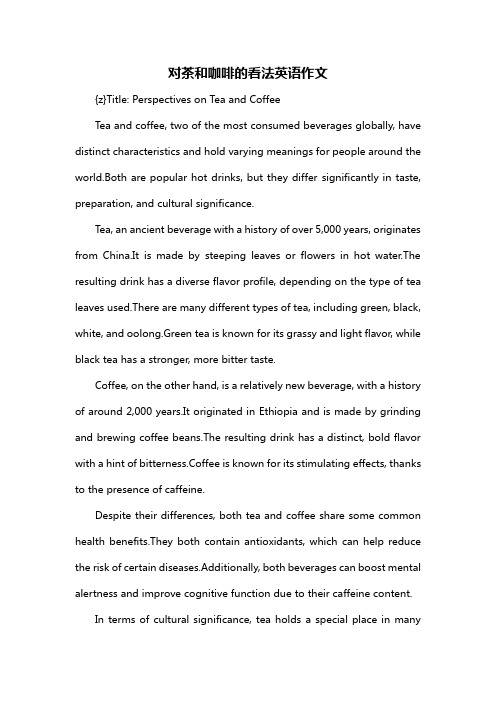
对茶和咖啡的看法英语作文{z}Title: Perspectives on Tea and CoffeeTea and coffee, two of the most consumed beverages globally, have distinct characteristics and hold varying meanings for people around the world.Both are popular hot drinks, but they differ significantly in taste, preparation, and cultural significance.Tea, an ancient beverage with a history of over 5,000 years, originates from China.It is made by steeping leaves or flowers in hot water.The resulting drink has a diverse flavor profile, depending on the type of tea leaves used.There are many different types of tea, including green, black, white, and oolong.Green tea is known for its grassy and light flavor, while black tea has a stronger, more bitter taste.Coffee, on the other hand, is a relatively new beverage, with a history of around 2,000 years.It originated in Ethiopia and is made by grinding and brewing coffee beans.The resulting drink has a distinct, bold flavor with a hint of bitterness.Coffee is known for its stimulating effects, thanks to the presence of caffeine.Despite their differences, both tea and coffee share some common health benefits.They both contain antioxidants, which can help reduce the risk of certain diseases.Additionally, both beverages can boost mental alertness and improve cognitive function due to their caffeine content.In terms of cultural significance, tea holds a special place in manyAsian countries, particularly in China and Japan.Tea ceremonies are an integral part of these cultures, symbolizing harmony, respect, and tranquility.In contrast, coffee is deeply ingrained in Western culture, with coffee shops dotting every corner in cities like Paris, London, and New York.In conclusion, tea and coffee are two popular beverages with their unique characteristics and cultural significance.While tea is light and versatile, coffee is bold and stimulating.Both have their health benefits and can be enjoyed in various forms.Whether you prefer the delicate flavor of tea or the bold taste of coffee, these beverages continue to be favorite choices worldwide.。
英语作文茶与咖啡
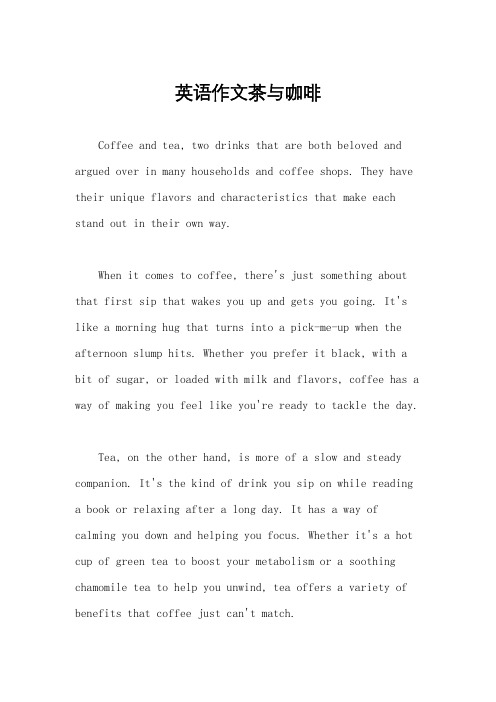
英语作文茶与咖啡Coffee and tea, two drinks that are both beloved and argued over in many households and coffee shops. They have their unique flavors and characteristics that make each stand out in their own way.When it comes to coffee, there's just something about that first sip that wakes you up and gets you going. It's like a morning hug that turns into a pick-me-up when the afternoon slump hits. Whether you prefer it black, with a bit of sugar, or loaded with milk and flavors, coffee has a way of making you feel like you're ready to tackle the day.Tea, on the other hand, is more of a slow and steady companion. It's the kind of drink you sip on while reading a book or relaxing after a long day. It has a way of calming you down and helping you focus. Whether it's a hot cup of green tea to boost your metabolism or a soothing chamomile tea to help you unwind, tea offers a variety of benefits that coffee just can't match.But don't get me wrong, I'm not saying one is better than the other. It's all about personal preference and mood. Sometimes you just need that strong cup of coffee to getyou through a tough day, and sometimes a cup of tea is all you need。
英语作文茶与咖啡
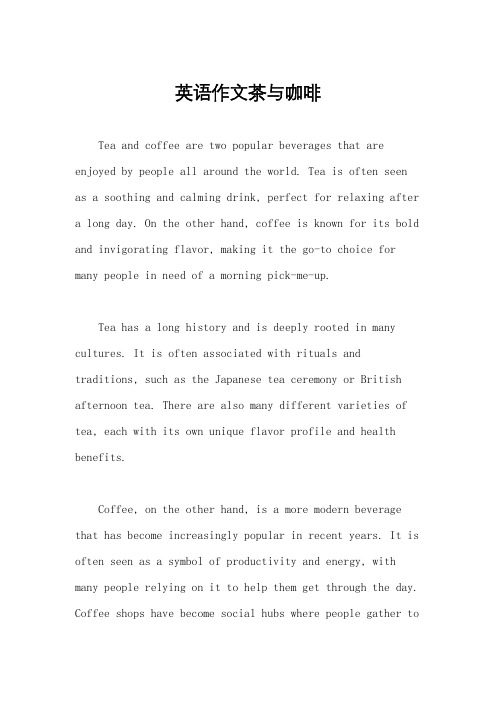
英语作文茶与咖啡Tea and coffee are two popular beverages that are enjoyed by people all around the world. Tea is often seen as a soothing and calming drink, perfect for relaxing after a long day. On the other hand, coffee is known for its bold and invigorating flavor, making it the go-to choice for many people in need of a morning pick-me-up.Tea has a long history and is deeply rooted in many cultures. It is often associated with rituals and traditions, such as the Japanese tea ceremony or British afternoon tea. There are also many different varieties of tea, each with its own unique flavor profile and health benefits.Coffee, on the other hand, is a more modern beverage that has become increasingly popular in recent years. It is often seen as a symbol of productivity and energy, with many people relying on it to help them get through the day. Coffee shops have become social hubs where people gather towork, socialize, or simply enjoy a cup of their favorite brew.Both tea and coffee have their own health benefits. Tea is rich in antioxidants and is believed to have a calming effect on the mind and body. Coffee, on the other hand, is known for its ability to improve focus and concentration, making it a popular choice for students and professionals alike.In terms of taste, tea and coffee are quite different. Tea is often described as delicate and floral, with a subtle sweetness that can be enjoyed hot or cold. Coffee, on the other hand, is bold and robust, with a rich and complex flavor that can be enjoyed black or with milk and sugar.Whether you prefer the soothing taste of tea or the bold flavor of coffee, both beverages have their own unique qualities that make them beloved by people all over the world. So next time you're in need of a drink, why not sit back and enjoy a cup of your favorite brew?。
- 1、下载文档前请自行甄别文档内容的完整性,平台不提供额外的编辑、内容补充、找答案等附加服务。
- 2、"仅部分预览"的文档,不可在线预览部分如存在完整性等问题,可反馈申请退款(可完整预览的文档不适用该条件!)。
- 3、如文档侵犯您的权益,请联系客服反馈,我们会尽快为您处理(人工客服工作时间:9:00-18:30)。
The culture differences of tea and coffee
As we all know,tea
、coffee and cocoa were known as the world's three major non-alcoholic characteristics of the tea is n atural fresh,while the coffee is well-known for its romantic and ,countries different cultural
backgrounds have distinctive preferences for
choice of drink. About the orig in of tea and coffee
Asia is the famous tea producing area,and tea culture originated from
China,then gradually spread throughout the modern society,although is popular all over the workpeople can think of the ancient orie ntal when it comes to is the symbol of the oriental culture.
Coffee is a kind of typical tropical crops,which origi nated from the ope ning of new sea-route,It gradually spread to all over the ,it is popularp in Europe,especially in the high think it is a symbol of the coffee was in troduced into the US,a nd now it is be loved by all ranks of society.
The place of tea and coffee
Chin ese tea culture is exte nsive and profo un d,the teahouse also has a long gen eral,the teahouse has not only quiet en vir onment but also an an cie nt is a good place of moder n urba n people to relax.
While in the west,the cafe all over the city and country is a sign of the
western way of wester ners drink coffee at any time of the day at home or in cafe has become a leisure place in people's busy life.
The represe ntative culture of tea and coffee
Tea carries many elements of chinese culture,which is a typical way of chin ese the say ing goes,"firewood,rice,cook ing oil,salt,soybea n and
with
the tea
sauce,vineger and tea are the seven necessities of daily life."It is eno ugh to illustrate the importa nt of tea in chi nese cultural has pure and fresh n ature,which can make people calm dow n and help to edify is con sistw nt with the chin ese con fucia n doctri ne.
Westerners can't leave the coffee as the tea to characteristics of western coffee culture in gen eral is en thusiastic,bold and un restra ines French can enjoy life most,the coffee culture of romantic French represe nts a roma ntic sen time nt,a kind of elega nt lasti ng appeal,which is also a traditional and unique coffee them,coffee is not only a drink
but more implied rich cultural conno tati on.
In moder n society,with the developme nt of econo mic globalizatio n. The cafe is increasing in China,and the tea also have an important position in western it also reflects the cultural globalizati on.。
